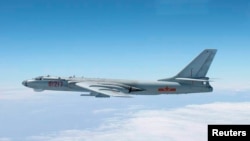ໃນການຊ້ອມລົບຫຼາຍຄັ້ງໃນທະເລ ແລະ ທ້ອງຟ້າອ້ອມເກາະໄຕ້ຫວັນໃນເດືອນທີ່ຜ່ານມາ, ຈີນ ໄດ້ສົ່ງເຮືອບິນໂຈມຕີທີ່ໃໝ່ທີ່ສຸດຈຳນວນນຶ່ງ, ກຳປັ່ນລົບ ແລະ ກຳລັງລູກສອນໄຟອອກໄປ. ແນວໃດກໍຕາມ, ນຶ່ງໃນອາວຸດທີ່ອັນຕະລາຍທີ່ສຸດຂອງເຂົາເຈົ້າທີ່ໃຊ້ຢູ່ໃນການຝຶກຊ້ອມດັ່ງກ່າວແມ່ນເຮືອບິນຖິ້ມລະເບີດທີ່ຖືກປັບປຸງໃໝ່ ທີ່ໄດ້ບິນຄັ້ງທຳອິດໃນຊຸມປີຕົ້ນໆຂອງສົງຄາມເຢັນ.
ຄືກັບ ອາເມຣິກາ, ທີ່ຍັງເພິ່ງພາອາໄສເຮືອບິນລົບ B-52 ທີ່ຖືກປັບປຸງໃຫ້ດີຂຶ້ນນັ້ນ, ເຊິ່ງແມ່ນເຮືອບິນຖິ້ມລະເບີດຈາກຍຸກສະໄຫມດຽວກັນ, ຈີນ ໄດ້ປະສົບຄວາມສຳເລັດໃນການປັບປຸງເຮືອບິນລົບອາຍພົ່ນ H-26 ໃຫ້ທັນສະໄໝ ເພື່ອດຳເນີນການບິນໃຫ້ດົນໃນສັດຕະວັດທີ 21.
ເຮືອບິນຖິ້ມລະເບີດນີ້ທີ່ຖືກນຳສະແດງໃນສື່ມວນຊົນລັດຖະບານ ຈີນ ໄດ້ບິນຂຶ້ນສຳລັບການດຳເນີນພາລະກິດທີ່ຖືກອອກແບບເພື່ອຂົ່ມຂູ່ ໄຕ້ຫວັນ ດັ່ງກັບສ່ວນນຶ່ງການຊ້ອມເກມສົງຄາມ. ການຊ້ອມລົບທີ່ຖືກຂະໜານນາມວ່າດາບຄູ່ 2024B ໂດຍກອງທັບ ຈີນ ນັ້ນ, ການຊ້ອມລົບດັ່ງກ່າວແມ່ນ “ການເຕືອນທີ່ເຄັ່ງຂຶມ” ຕໍ່ປະຊາຊົນ ໄຕ້ຫວັນ ທີ່ສະແຫວງຫາເອກະລາດ, ອີງຕາມການກ່າວຂອງກອງທັບ ຈີນ.
ກະຊວງປ້ອງກັນປະເທດ ໄຕ້ຫວັນ ໄດ້ລາຍງານວ່າ ເຮືອບິນກອງທັບ ຈີນ 153 ລຳ, ກຳປັ່ນທະຫານເຮືອ 14 ລຳ ແລະ ກຳປັ່ນອື່ນໆ 12 ລຳ ຖືກພົບເຫັນຢູ່ອ້ອມເກາະດັ່ງກ່າວໃນໄລຍະ 25 ຊົ່ງໂມງຫຼັງຈາກເລີ່ມຕົ້ນການຝຶກຊ້ອມໃນວັນທີ 14 ຕຸລາ. ກະຊວງຍັງໄດ້ລາຍງານວ່າເຮືອບິນ 111 ລຳໄດ້ບິນຂ້າມເສັ້ນແຍກຂອງຊ່ອງແຄບ ໄຕ້ຫວັນ ແລະ ໄດ້ເຂົ້າໄປໃນເຂດປ້ອງກັນອາກາດຂອງເກາະນັ້ນ.
ກະຊວງປ້ອງກັນປະເທດ ໄຕ້ຫວັນ ໄດ້ກ່າວຕໍ່ອົງການຂ່າວ ຣອຍເຕີ ວ່າ “ເຮືອບິນ H-6 ສາມກຸ່ມ” ຖືກກວດພົບວ່າປະຕິບັດການຢູ່ໃນເຂດໜ່ານຟ້າຂອງເກາະ ໃນລະຫວ່າງການຊ້ອມລົບຂອງກອງທັບ ຈີນ. ສອງກຸ່ມດັ່ງກ່າວ “ໄດ້ດຳເນີນການຊ້ອມໂຈມຕີຈຳລອງ,” ອີງຕາມກະຊວງ.
ກອງທັບ ຈີນ ບໍ່ໄດ້ຕອບຕໍ່ຄຳຖາມສຳລັບຂ່າວນີ້.
ເຮືອບິນຖິ້ມລະເບີດ H-6 ທີ່ຖືກປັບປຸງໃໝ່ຂອງຈີນ ຈຳນວນນຶ່ງຕອນນີ້ແມ່ນສາມາດຍິງລູກສອນໄຟຂີປະນາວຸດ ທີ່ຕິດດ້ວຍຫົວລະເບີດນິວເຄລຍ ໃນຂະນະທີ່ລຳອື່ນໆສາມາດຕິດຕັ້ງລູກສອນໄຟໄລຍະໄກຕໍ່ຕ້ານກຳປັ່ນຫຼາຍລູກ ແລະ ການໂຈມຕີໄລຍະໄກ, ອີງຕາມບັນດານັກວິເຄາະການປ້ອງກັນປະເທດ ແລະ ລາຍງານຂອງທຳນຽບຫ້າແຈ ກ່ຽວກັບ ກອງທັບ ຈີນ. ບາງລຳແມ່ນສາມາດຕື່ມນ້ຳມັນກາງອາກາດ, ໂດຍອະນຸຍາດໃຫ້ມັນບິນຈາກຖານທັບຕ່າງໆຢູ່ໃນຈີນແຜ່ນດິນໃຫຍ່ ແລະ ໂຈມຕີເປົ້າໝາຍເລິກເຂົ້າໄປໃນພາກຕາເວັນຕົກຂອງມະຫາສະໝຸດປາຊີຟິກ, ບ່ອນທີ່ ສະຫະລັດ ມີຖານທັບຂະໜາດໃຫຍ່ຕ່າງໆໃນເກາະ ກວາມ ແລະ ບ່ອນອື່ນໆ.
ອ່ານຂ່າວນີ້ເປັນພາສາອັງກິດ
In a series of war games in the seas and skies around Taiwan last month, China deployed some of its newest strike aircraft, warships and missile forces. However, one of the most menacing weapons used in the drills: an updated version of a bomber that first flew in the early years of the Cold War.
Like America, which still relies on upgraded versions of the B-52, a bomber from the same era, China has successfully modernized its jet-powered H-6 to carry on flying deep into the 21st Century.
These bombers were shown on China’s state-controlled media taking off for missions designed to intimidate Taiwan as part of the war-game drills. Dubbed Joint-Sword 2024B by China’s military, the maneuvers were a “[USN:L4N3LP04Q TEXT:“stern warning”]” to people on Taiwan seeking independence, the Chinese military said.
Taiwan’s Ministry of National Defense reported that 153 Chinese military aircraft, 14 naval vessels and 12 other ships were detected around the island over a 25-hour period after the start of the exercise on Oct. 14. The ministry also reported that 111 of the aircraft had crossed the median line of the Taiwan Strait and entered the island’s Air Defense Identification Zone (ADIZ).
Taiwan’s defense ministry told Reuters that “three groups of three H-6 aircraft” had been detected operating in the island’s air space during China’s military exercise. Two of the groups “conducted simulated attack drills,” the ministry said.
China’s defense ministry didn’t respond to questions for this story.
Some modernized versions of China’s H-6 bomber are now capable of launching ballistic missiles armed with nuclear warheads while others can carry multiple long-range anti-ship and land attack missiles, according to defense analysts and Pentagon reports on the Chinese military. Some versions can be refueled in flight, allowing them to fly from bases on the Chinese mainland and strike at targets deep into the Western Pacific, where the U.S. has large bases on Guam and elsewhere.





ຟໍຣັມສະແດງຄວາມຄິດເຫັນ